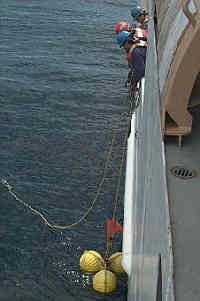| |
Science
Report:
After weeks of
preparation we are on our way to Axial Volcano on the Juan de Fuca Ridge!
Leg 2 of the 2000 Vents Program, featuring bottom pictures and sampling
using the remotely operated vehicle ROPOS, finished in Victoria BC on
July 18. Leg 3 departed Victoria on July 20 and is returning again to
Axial Volcano, as well as other hydrothermally active locations on the
Juan de Fuca Ridge. This Leg will concentrate on studying hydrothermal
plumes in the water column. Hydrothermal plumes are created when hot vent
fluid mixes with cold seawater to form clouds of diluted hydrothermal
emissions. These plumes are carried away with the deep-sea currents like
campfire smoke in a gentle breeze, becoming more dilute the farther they
travel and mix with the surrounding seawater.
Mapping and sampling the
plumes can tell us a lot about what is happening on the seafloor. We can
estimate the chemical composition of the hydrothermal vent fluids by what
we find in the plumes, and we can estimate the amount of fluid coming
out from an entire vent field by the size and concentration of the plume
that overlies it. We have studied plumes at Axial since the volcanic eruption
of January 1998 and have learned that the hydrothermal system created
by the eruption was extremely widespread and vigorous immediately after
the eruption. Since then the field has slowly declined so that by the
summer of 1999 the volume of fluids being discharged was only about 10%
of that just after the eruption. One of our objectives on this leg is
to find out if this rate of decline has continued in the past year.
But before we can do science
we have to get our gear ready. Tomorrow we will be testing some of our
equipment and preparing to recover instruments that we left on the seafloor
a year ago. Tune in tomorrow to see if we get our gear back from the deep
blue sea!
|
|

Recovery of
current meter mooring which has been monitoring the activity near Axial
volcano for over a year.
|
|

